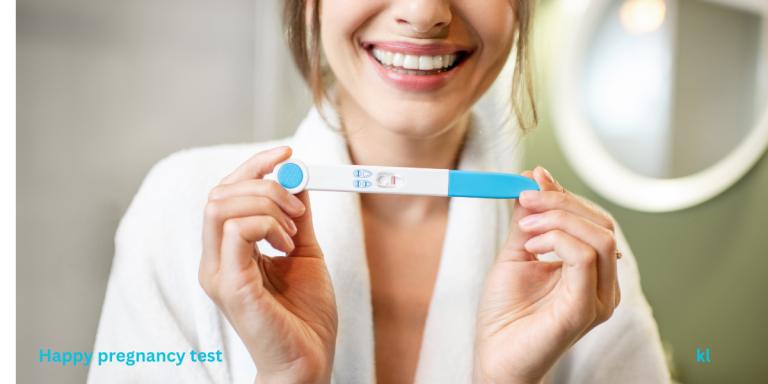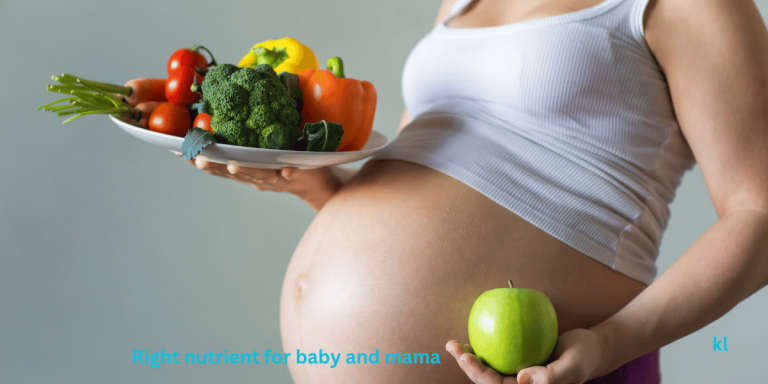Did you know that proper prenatal Vitamins could prevent up to more than 70% of neural tube defects? Pregnancy is a transformative journey, especially for first-time moms.
It can be exciting but overwhelming when navigating all the health advice out there. One key recommendation from doctors, nutritionists, and even other moms is taking a high-quality prenatal vitamin.
These vitamins are specially formulated to support both you and your baby during this crucial time. That’s exactly why choosing the right prenatal vitamin isn’t just important – it’s essential for your baby’s development.
Here’s a look at the 9 Best Prenatal Vitamins for First-Time Moms: Expert-Approved to give you peace of mind and help you feel confident in your choice.
- How We Picked These 9 Best Prenatal Vitamins.
- 1. Nature Made Prenatal Multi + DHA
- 2. Best Organic Prenatal Vitamin: Garden of Life Vitamin Code Prenatal
- 3. Best Gummy Prenatal Vitamin: Olly Prenatal Multivitamin + DHA
- 4. Best Preconception vitamin: TheraNatal Core Preconception
- 5. Best Whole-Food and Morning Sickness Option: New Chapter Perfect Prenatal Multivitamin
- 6. Best liquid prenatal: Pink Stork Total Prenatal Vitamin
- 7. Best Subscription and Vegan: Ritual Essential Prenatal Vitamin
- 8. Best Optimal Nutrient: FullWell Prenatal Multivitamin
- 9. Best for Omega-3 DHA Support: Nordic Naturals Prenatal DHA
- FAQ
How We Picked These 9 Best Prenatal Vitamins.
Walking into the supplement aisle can feel completely overwhelming. When I was pregnant with my first child, I remember staring at the endless options and wondering how on earth I was supposed to choose.
With so many options available, it was tough to determine what was worth my money and what would truly benefit me. That’s why I’ve consulted with experts—including board-certified OB-GYNs and registered nutritionists—and spent hours researching (and trying) these prenatal vitamins.
Together, we’ve evaluated over 30 different prenatal vitamins, digging deep into their formulations, absorption rates, and real-world effectiveness to narrow down the 9 best options for first-time moms. From folic acid to DHA, these vitamins offer everything you and your baby need to thrive.
What Makes This Guide Different?
While many reviews just scratch the surface, we’ve done the heavy lifting for you. We’ve analyzed peer-reviewed studies, examined third-party testing results, and gathered feedback from hundreds of moms.
Plus, each vitamin on our list has been personally vetted by our expert panel for safety and efficacy.
Think of this as your evidence-based roadmap to choosing the perfect prenatal vitamin. Whether you’re dealing with morning sickness, following a special diet, or just want to ensure the absolute best start for your little one, we’ve got you covered with expert-approved recommendations that you can trust.
Let’s dive in and find the perfect prenatal vitamin for your pregnancy journey.
1. Nature Made Prenatal Multi + DHA
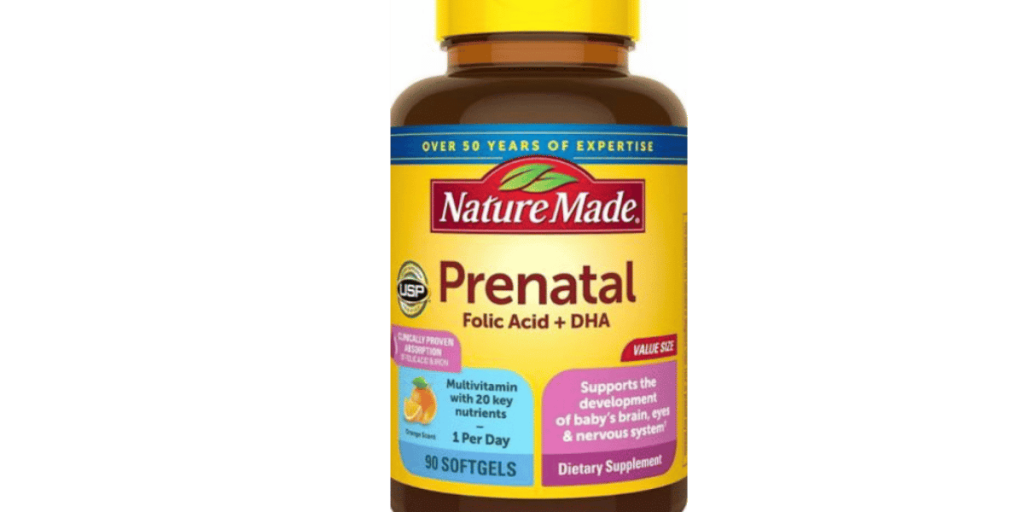
Why It’s the Top Pick
Nature Made Prenatal Multi + DHA stands out as the best overall prenatal vitamin due to its balanced combination of essential nutrients: Folic Acid (800 mcg): Essential for preventing neural tube defects Iron (27 mg): Helps prevent anemia during pregnancy. Vitamin D (1000 IU): Supports calcium absorption for bone health., Calcium (150 mg): Supports the development of strong bones and teeth for both mom and baby.
All at an affordable price. It also includes 200 mg of DHA, a crucial omega-3 fatty acid for brain and eye development, making it a comprehensive supplement for first-time moms.
It’s widely recommended by doctors and is USP verified, meaning it’s been tested for quality and purity, giving moms peace of mind.
- Includes DHA and essential vitamins in one capsule, minimizing the need for additional supplements.
- USP verified (this is huge – only 1% of supplements earn this).
- Affordable and easily available in most pharmacies.
- No artificial colors or flavors.
- capsule is large.
- Mild nausea if taken on an empty stomach.
- Contains fish oil (not for vegans).
Expert Opinion
OB-GYNs often recommend Nature Made Prenatal Multi + DHA due to its comprehensive formula and affordability. It covers the essential nutrients most women need during pregnancy without unnecessary additives.
Real Mom Reviews
Users generally praise the affordability and convenience of combining DHA and prenatal vitamins in one pill. However, a few moms mention experiencing slight nausea and recommend taking it with food. Overall, it’s considered reliable and effective.
Bottom Line
If you’re looking for a science-backed, complete prenatal that won’t break the bank or your stomach, Nature Made Prenatal Multi + DHA is your best bet.
2. Best Organic Prenatal Vitamin: Garden of Life Vitamin Code Prenatal
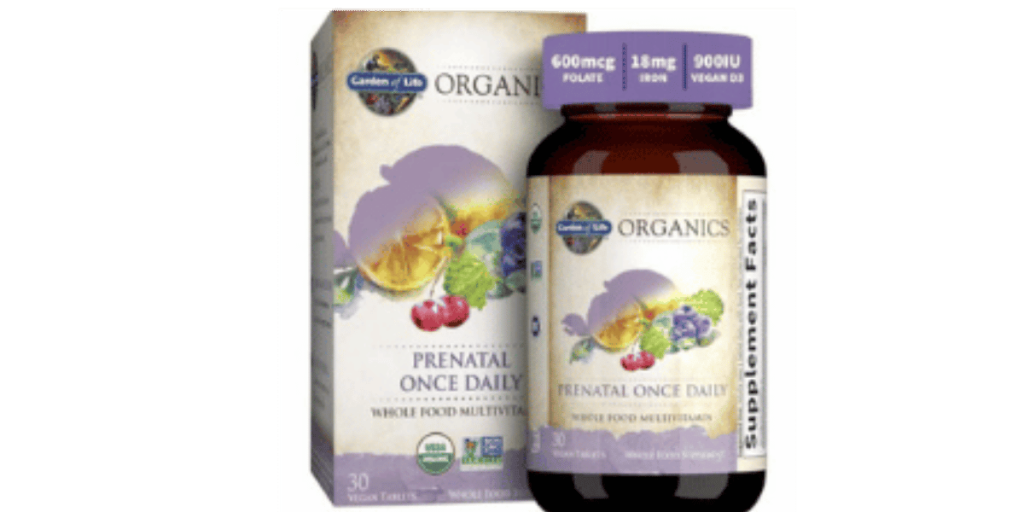
Why It’s the Top Pick
Garden of Life Vitamin Code Prenatal is the top choice for moms seeking an organic, whole-food-based prenatal vitamin.
It’s certified organic, non-GMO, and free from synthetic binders, fillers, and artificial ingredients, making it an excellent pick for health-conscious moms. Think of it as your daily salad, superfood smoothie, and prenatal all rolled into one.
The coolest part? They’ve managed to pack over 30 organic fruits, vegetables, and herbs into each serving without sacrificing potency. The formula also includes probiotics and digestive enzymes to support digestive health, which can be a big help during pregnancy when digestion issues are common.
Key Ingredients (All Organic!): Folic Acid (800 mcg from Organic Food Blend): Supports healthy fetal development. Iron (18 mg): Helps combat pregnancy-related anemia. Vitamin D3 (1400 IU): Promotes healthy bone development for both mom and baby. Probiotics and Digestive Enzymes: Aid digestion and support gut health. Organic Ginger: Known to help reduce nausea.
- Made from real foods.
- USDA Certified Organic (rare for prenatal!).
- Certified vegan and gluten-free.
- Includes digestive enzymes and probiotics to support gut health.
- Three tablets daily are required.
- Higher price point compared to other prenatal vitamins.
Expert Opinion
Health experts, including nutritionists, recommend Garden of Life Vitamin Code Prenatal for moms who prefer a clean, organic option. The addition of digestive support and plant-based ingredients is praised for its holistic approach to prenatal care.
User Reviews Summary
Users appreciate the clean, whole-food-based formula, with many noting that the digestive enzymes help with pregnancy-related nausea and bloating. However, some mention the inconvenience of taking multiple capsules daily. Despite this, it’s well-loved for being a high-quality organic option.
“Worth every penny – finally a prenatal that didn’t make me nauseous! Yes, it’s pricier than others, but considering it’s real food and not synthetic vitamins, I feel so much better about taking it.”
Bottom Line
While it’s an investment, Garden of Life’s Prenatal is worth considering if you’re committed to organic nutrition during pregnancy. I especially recommend it for moms who’ve had trouble tolerating traditional prenatal or those who prioritize whole-food supplements.
3. Best Gummy Prenatal Vitamin: Olly Prenatal Multivitamin + DHA

Why It’s the Top Pick
Olly Prenatal Multivitamin + DHA is the best gummy prenatal due to its simplicity, ease of use, and delicious gummy format. It is made up of 15 essential vitamins and minerals. Key ingredients include Folic Acid (400 mcg): Which is vital for fetal neural tube development.
Omega-3 DHA (30 mg): Supports brain and eye development for the baby, Vitamin D (20 mcg): Essential for calcium absorption and bone health, Vitamin B6 (2 mg): Helps combat morning sickness and Natural citrus flavoring. It’s a complete prenatal that supports the baby’s brain and heart development with DHA.
- The gummy format makes it easy and enjoyable to take.
- Contains Omega-3 DHA without a fishy aftertaste.
- Suitable for vegetarians.
- Two servings daily are required.
- Some users may find it too sweet.
Expert Opinion
Nutritionists often recommend Olly Prenatal for its balanced formula that covers the basics in a convenient format. While gummies typically lack iron, Olly’s choice to use premium forms of key nutrients like methyl folate makes them a solid choice, especially for women struggling with pill forms.
User Reviews Summary
Moms love the taste and convenience of Olly Prenatal Gummies, praising how easy they are to incorporate into their daily routine. Many report they appreciate the absence of the usual “fishy” aftertaste that comes with DHA. However, a few wish the gummies included more iron and calcium.
Bottom Line
Olly’s gummies are perfect for moms who can’t tolerate traditional pills. Just remember to add an iron supplement after consulting with your doctor.
4. Best Preconception vitamin: TheraNatal Core Preconception

Why It’s the Top Pick
TheraNatal Core Preconception by Theralogix is a top choice for those seeking a prenatal vitamin rich in nutrient density and quality. It’s designed with fertility and prenatal experts to meet the nutritional needs of women before and during pregnancy.
Known for its comprehensive blend of vitamins and minerals, it supports fertility, healthy fetal development, and overall maternal health. TheraNatal’s high purity standards and expert formulation make it a trusted option among healthcare providers and expectant mothers alike.
Key nutrients include Folate (1 mg): In its bioavailable form (L-methyl folate) for better absorption, supporting neural development, Iodine (150 mcg): Which supports healthy thyroid function, crucial during pregnancy, Choline (100 mg): Important for brain development in the fetus, Omega-3 DHA (300 mg): Supports cognitive development in babies and heart health in mothers.
- Medical-grade quality assurance(Medical-grade quality assurance refers to a higher standard of testing, manufacturing, and quality control).
- Designed specifically for women preparing for pregnancy, with bioavailable ingredients for maximum absorption.
- Includes essential nutrients like choline and DHA in effective dosages.
- Third-party tested for purity and quality, ensuring a high standard of supplement.
- Large pill size.
- Some users report fishy burps from DHA.
Expert Opinion
”TheraNatal’s medical-grade formulations provide optimal nutrient levels for conception and pregnancy. Due to its focus on quality and clinical research backing, it is frequently recommended by OB-GYNs and fertility specialists.
Experts also appreciate the inclusion of bioavailable folate and choline, which many prenatal products lack. Patients using TheraNatal had notably better outcomes than those using standard over-the-counter prenatal products.
User Reviews Summary
Users of TheraNatal generally report feeling more confident in their prenatal health with this formula, thanks to its science-backed formulation and quality ingredients. Positive feedback highlights the sustained energy and peace of mind it provides.
Some users note the high price but feel the investment is worth the exceptional quality and purity. The two-step system (vitamin plus DHA) is appreciated by some but seen as inconvenient by others.
Special Considerations
TheraNatal Core: Standard prenatal support.
TheraNatal OvaVite: Specific for egg quality and fertility.
TheraNatal One: Once-daily convenience option.
Bottom Line
TheraNatal represents a premium, medical-grade option in the prenatal vitamin market. While the higher price point may be a barrier for some, the quality formulation and stage-specific options make it a top choice for those seeking optimal prenatal nutrition, particularly when dealing with fertility challenges or specific nutritional needs.
5. Best Whole-Food and Morning Sickness Option: New Chapter Perfect Prenatal Multivitamin

Why It’s the Top Pick
New Chapter Perfect Prenatal Multivitamin stands out as a top pick for expectant mothers seeking whole-food-based nutrition. Its gentle-on-the-stomach formula uses fermented nutrients derived from organic vegetables and herbs, making it easier to digest and absorb.
Many moms-to-be prefer New Chapter for its emphasis on organic, non-GMO ingredients and its comprehensive mix of vitamins and minerals that support both maternal health and baby’s development.
Key ingredients include: Folate (600 mcg): Includes methylated folate, crucial for neural tube development, Iron (18 mg): Gentle on the stomach, supports blood health and energy, Vitamin D3 (1,000 IU): Important for calcium absorption, bone health, and immune support, Iodine (150 mcg): Supports healthy thyroid function, which is essential during pregnancy, Organic herbal blend: Includes ingredients like organic ginger and chamomile to support digestion and soothe morning sickness.
- Whole-food-based and fermented formula for easier digestion.
- Gentle on sensitive stomachs, even when taken on an empty stomach.
- Made with organic ingredients.
- Soothe morning sickness.
- Three tablets daily may be inconvenient for some users.
- No DHA is included, so additional supplementation is necessary for Omega-3s.
Expert Opinion
Nutritionists often recommend New Chapter Perfect Prenatal Multivitamins to moms who prefer plant-based, organic ingredients in their prenatal supplements.
Experts highlight its fermented nutrients, which can be more easily absorbed by the body, and the inclusion of herbs that support digestion. While it doesn’t contain DHA, many professionals suggest pairing it with a separate Omega-3 supplement to cover all prenatal needs.
User Reviews Summary
Moms-to-be appreciate the high-quality, organic ingredients in New Chapter Perfect Prenatal, along with its stomach-friendly formula. Users often note that the supplement is easy on their stomachs, even if taken on an empty stomach, which is a huge benefit during morning sickness.
Some users mention the inconvenience of taking three tablets daily, but many are happy with the product’s comprehensive, whole-food-based ingredients and gentle effect on digestion.
Bottom Line
New Chapter Perfect Prenatal offers a premium, whole-food-based option for those seeking a gentle, organic prenatal vitamin.
Though it requires separate DHA supplementation, its exceptional digestibility and high-quality ingredients make it a top choice, especially for those with sensitive stomachs or who prioritize organic, whole-food supplements.
6. Best liquid prenatal: Pink Stork Total Prenatal Vitamin

Why It’s the Top Pick
Pink Stork Total Prenatal Vitamin is popular for its clean ingredients and gentle formula, making it ideal for women with sensitive stomachs. Pink Stork uses high-quality, natural ingredients without synthetic fillers or harsh additives. It also supports digestion and immune health.
It’s especially good for women who have morning sickness or don’t want to take multiple pills each day. The brand’s commitment to empowering women throughout their motherhood journey makes it a standout choice.
Key ingredients include Folate (800 mcg): A methylated form that supports fetal neural development and easy absorption, Iron (27 mg): Which helps prevent iron deficiency, supporting energy and blood health, Vitamin B6 (2 mg): Known for reducing morning sickness and nausea, Probiotics: Supports digestive health, easing common pregnancy-related digestive issues, Iodine (150 mcg): Supports thyroid health, which is crucial for fetal brain development.
- Great for reducing nausea and morning sickness, thanks to added Vitamin B6 and probiotics.
- No fishy taste or burps.
- Free of GMOs, gluten, dairy, and artificial ingredients, making it a clear choice.
- Affordable price point.
- Limited retail availability.
- Lower DHA amount than some competitors.
Expert Opinion
Nutritionists and obstetricians often recommend Pink Stork to women who experience digestive sensitivity or morning sickness during pregnancy.
The addition of probiotics and Vitamin B6 makes it especially supportive for gut health, while the methylated folate ensures optimal absorption. Many health experts appreciate Pink Stork’s dedication to clean, high-quality ingredients tailored to meet the needs of pregnant women.
User Reviews Summary
Users love Pink Stork Total Prenatal Vitamin for its high-quality ingredients and focus on gentle digestion. Many moms-to-be mention that they experience less nausea with this formula and appreciate the clean ingredient profile.
Bottom Line
it’s gentle on the stomach and includes the basics you need. It’s perfect for women who have trouble with morning sickness or don’t want to take multiple pills each day.
7. Best Subscription and Vegan: Ritual Essential Prenatal Vitamin
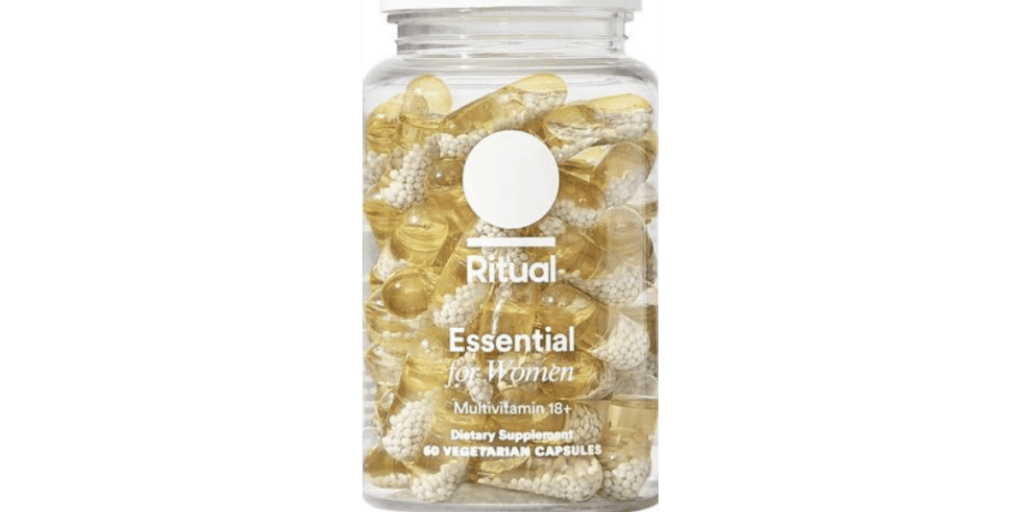
Why It’s the Top Pick
Ritual Essential is a subscription-based prenatal vitamin known for its transparency in sourcing and minimalist formulation. The brand highlights each ingredient’s origin and purpose, so moms know exactly what they’re taking. The soft gel capsules are designed for optimal absorption and include only essential nutrients without unnecessary fillers.
Plus, Ritual’s delayed-release design makes these vitamins gentler on the stomach—ideal for women dealing with morning sickness.
Key ingredients include Methylated Folate (1000 mcg): Which supports neural tube development and is bioavailable for women with MTHFR gene variations, Omega-3 DHA (350 mg): Derived from algae, promoting fetal brain and eye development, Vitamin D (2000 IU): Supports bone health for both mom and baby, Iron (18 mg): Supports oxygen transport and energy levels, Magnesium (30 mg): Helps reduce cramps and supports muscle and nerve health.
- Highly transparent ingredient sourcing and clear labeling.
- Vegan-friendly, allergen-free, and non-GMO.
- Contains essential DHA from algae, making it a good choice for vegetarians and vegans.
- Delayed-release capsule designed to be gentle on the stomach.
- Two pills daily are required.
- Limited retail availability.
Expert Opinion
Nutritionists and healthcare providers often recommend Ritual for moms-to-be who prioritize clean ingredients and a focused nutrient profile.
Experts appreciate that Ritual sources each ingredient responsibly and provides bioavailable forms, making it easy for women to absorb essential nutrients. However, they suggest supplementing calcium separately, as it’s not included.
User Reviews Summary
Moms appreciate the simplicity and transparency Ritual offers, particularly those who have struggled with prenatal vitamins causing nausea.
Many reviewers mention the pleasant minty aftertaste and the gentle impact on the stomach, which is especially beneficial during the first trimester. While some find it lacking in certain nutrients like calcium, others feel reassured by Ritual’s commitment to essential, clean ingredients.
Bottom Line
Ritual Essential Prenatal is a good choice for women who value transparency in their supplements and prefer a clean, vegan formula, While it’s pricier than some alternatives, the quality ingredients, innovative delivery system, and focus on reducing nausea make it worth considering.
8. Best Optimal Nutrient: FullWell Prenatal Multivitamin
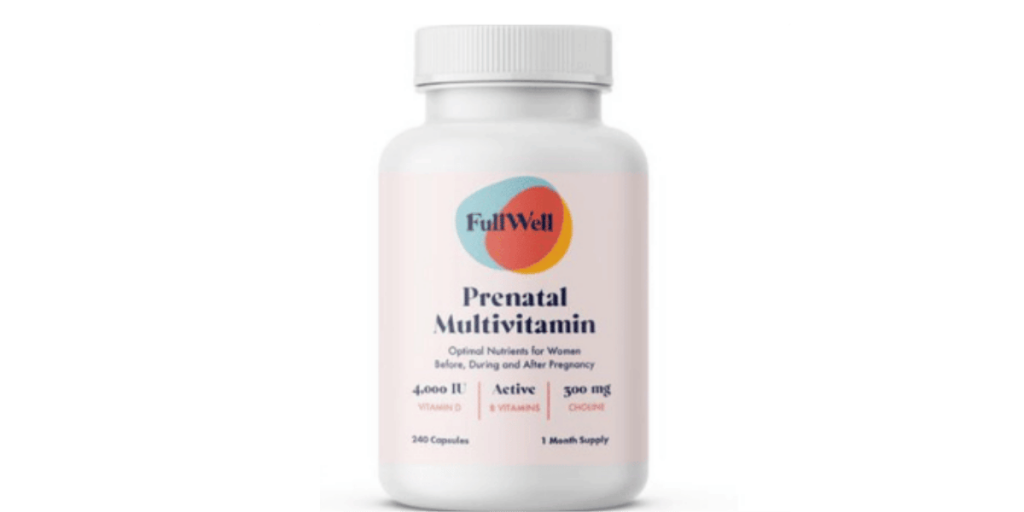
Why It’s the Top Pick
FullWell Prenatal Multivitamin is a highly recommended choice due to its comprehensive formulation, backed by research and designed by a registered dietitian who specializes in fertility and prenatal health.
It’s known for its high-quality ingredients, effective dosages, and the fact that it covers all essential nutrients: Folate (800 mcg): Which supports fetal brain and spine development, a critical nutrient in pregnancy, Choline (300 mg): Important for brain development in babies, which is often missing in many other prenatal vitamins.
Vitamin D3 (4000 IU): Helps with calcium absorption and supports strong bones and immune health, Magnesium (300 mg): Aids in muscle relaxation and helps prevent leg cramps, Iodine (290 mcg): Essential for proper thyroid function, helping to regulate metabolism and development in babies. for both mother and baby, including an optimal balance of vitamins and minerals that go beyond basic requirements. It’s a favorite among those seeking a science-backed approach to prenatal nutrition.
- Includes optimal doses of key nutrients like choline and magnesium, which are often underrepresented in other prenatal vitamins.
- Designed by a registered dietitian, ensuring high-quality, well-researched ingredients.
- Free from synthetic fillers, gluten, and GMOs.
- Helps prevent nausea, thanks to well-tolerated forms of nutrients.
- Requires taking multiple capsules daily, which can be difficult for some to manage.
- Does not include DHA, so an additional fish oil supplement is recommended.
Expert Opinion
Experts, particularly those in the field of fertility and prenatal nutrition, strongly endorse FullWell for its thoughtful formulation. They appreciate that it includes often-missing nutrients like choline and magnesium in generous amounts.
While some find the number of pills daunting, the comprehensive coverage of essential nutrients makes it a top choice for moms wanting the best for both themselves and their babies.
User Reviews Summary
FullWell Prenatal receives high marks from moms who appreciate the thoroughness of the formula and its positive effects on energy and overall well-being during pregnancy.
Many report feeling more confident knowing they are getting important nutrients not found in other vitamins. However, some users struggle with the number of capsules required each day and the lack of DHA, which means taking an additional supplement.
Bottom Line
Fullwell costs more than regular prenatal vitamins, but you’re paying for better quality. Because it contains better ingredients and more nutrients. Some might not like taking multiple pills each day. but it’s a great choice for women who want the best possible prenatal vitamin and don’t mind spending more on quality.
9. Best for Omega-3 DHA Support: Nordic Naturals Prenatal DHA

Why It’s the Top Pick
Nordic Naturals Prenatal DHA is a top choice for moms who want a high-quality source of Omega-3 DHA, an essential nutrient for supporting brain, eye, and nervous system development in the fetus. Known for its purity, Nordic Naturals uses sustainably sourced fish oil and ensures it meets strict standards for freshness and quality, making it ideal for those looking to avoid synthetic or low-quality Omega-3s in their prenatal routine.
Key ingredients includes: Omega-3 DHA (480 mg): Supports fetal brain and eye development and promotes a healthy pregnancy, Omega-3 EPA (205 mg): Works with DHA to support heart and overall health for both mom and baby, Vitamin D3 (400 IU): Essential for immune and bone health, sourced naturally.
- High-quality DHA source, made from wild-caught, sustainably sourced fish.
- Non-GMO verified and third-party tested for purity and safety.
- Easily digestible and flavor-masked soft gels for minimal fishy aftertaste.
- Contains no artificial flavors, colors, or preservatives.
- Must be refrigerated after opening.
- Slightly more expensive than some other DHA supplements.
Expert Opinion
Many OB-GYNs and nutritionists recommend Nordic Naturals for its high-quality DHA, a nutrient often underrepresented in typical prenatal vitamins. DHA is critical for fetal brain and eye development, and experts frequently highlight Nordic Naturals’ exceptional quality control standards and sustainability practices. Though it doesn’t provide other prenatal vitamins, pairing it with a multivitamin can create a comprehensive prenatal regimen.
User Reviews Summary
Moms often rave about Nordic Naturals Prenatal DHA’s high purity and ease of digestion. Users who typically experience a fishy aftertaste with other brands are pleasantly surprised by the freshness and minimal aftertaste of this supplement. While some find it a bit pricey, others feel it’s worth it for the peace of mind and quality DHA they’re getting.
Bottom Line
Nordic Naturals Prenatal DHA is one of the highest-quality omega-3 supplements available for pregnant women. While it costs more than basic fish oil supplements, its superior purity, absorption, and taste make it worth the investment. It’s especially good for women who are sensitive to fishy tastes or want the best quality DHA for their pregnancy.
To wrap it all up, finding the right prenatal vitamin can make a world of difference in supporting a healthy pregnancy, especially if it’s your first time navigating this exciting journey.
Each of the nine options we covered is packed with the essential nutrients you and your baby need—from folic acid for neural development to iron for energy and DHA for brain health.
Remember, choosing a prenatal is about more than just the label; it’s about finding what works best for your unique needs and any personal preferences (like gummies vs. pills!).
Whether you want an organic option, something gentle on the stomach, or a multivitamin tailored specifically for vegetarians, there’s a choice here for every mom-to-be.
As always, don’t hesitate to consult your healthcare provider—they’re the best resource for helping you select a vitamin that fits your health profile. and don’t forget that a balanced diet and healthy lifestyle go hand-in-hand with any prenatal supplement.
When it comes to prenatal vitamins, quality is everything—and we get that. That’s why we’ve carefully selected only the most reputable brands for our list of the 9 best prenatal vitamins. Our recommendations are here to give you peace of mind on your journey from bump to birth!
FAQ
1.When Should I Start Taking Prenatal Vitamins?
The best time to start taking prenatal vitamins isn’t always right after a positive test result. Ideally, if you’re planning on having a baby or even considering it, you might want to start a little earlier—about three months before you start trying, to be specific.
Why so early? Here’s what I learned: many of the nutrients in prenatal vitamins, especially folic acid, play a key role in those super early stages of development. We’re talking about the days when the tiny neural tube starts forming, which eventually becomes the baby’s brain and spine.
Folic acid is crucial for this, and by the time you get that positive pregnancy test, these early structures are already in the works. So, it’s more of a “better safe than sorry” situation, where taking the vitamin earlier ensures your body has everything it needs from day one.
2.Can I Take Prenatal Vitamins On Empty Stomach?
Taking prenatal vitamins on an empty stomach can be a bit tricky. Some people handle it just fine, but for others, it can lead to nausea or a queasy stomach—especially if the prenatal contains iron, which can be a bit harsh on the stomach lining.
Iron is essential for preventing anemia, but it’s also known to be a little hard to digest on its own, which is why it often goes down easier with food. If you’ve got a sensitive stomach, try taking your prenatal with a small snack or right after a meal.
Even something light, like a piece of toast or a few crackers, can help your body absorb the nutrients more comfortably. I’ve found that taking mine in the evening with dinner or just before bed works well—especially during those early weeks of pregnancy when nausea is at its peak.
However, if mornings work best for your routine, a food-based prenatal like New Chapter Perfect Prenatal Multivitamin might be gentler on your stomach when taken without food. These are usually made with whole foods, making them easier for some people to digest on an empty stomach.
So, in short: Yes, you can take prenatal vitamins on an empty stomach, but if you feel any discomfort, try pairing them with a small meal or snack, or experiment with different times of day. That way, you’ll still get all the benefits without an upset stomach!
3.What Is The Difference Between Folic Acid and Folate?
Great question! Folic acid and folate are often used interchangeably, but they aren’t quite the same. Folate is the natural form of vitamin B9, found in foods like leafy greens, beans, and citrus fruits. Folic acid, on the other hand, is the synthetic form of B9 that’s commonly found in supplements and fortified foods.
One of the main differences between the two is how the body processes them. Folate from foods is typically more bioavailable, meaning it’s easier for your body to absorb and use. Folic acid, though effective, has to be converted by the liver into the active form of folate before the body can use it.
For most people, this process works just fine, but some individuals have a genetic variation (known as an MTHFR gene mutation) that makes it harder for their bodies to convert folic acid into its usable form. This is one reason why some people choose “methyl folate” supplements, which provide a pre-converted form that’s easier for the body to absorb.
When it comes to pregnancy, both folic acid and folate are incredibly important. They play a crucial role in preventing neural tube defects like spina bifida, which is why it’s recommended that women start taking folic acid or folate well before they conceive.
The CDC recommends that all women of childbearing age get at least 400 micrograms of folic acid daily, as the neural tube develops very early in pregnancy—often before a woman even realizes she’s pregnant.
In short:
- Folate: Natural form, found in foods, and typically easier for the body to use.
- Folic Acid: Synthetic form, common in supplements, requires conversion in the body to be fully effective.
If you’re considering which one to take, consult your healthcare provider, especially if you have a family history of the MTHFR mutation. Many prenatal vitamins now offer both options, so you can choose what’s best for your needs!
4.What Is DHA
DHA, or docosahexaenoic acid, is a type of omega-3 fatty acid that’s crucial for brain and eye development—especially for babies during pregnancy and the first few years of life. It’s one of those nutrients that really packs a punch for both moms and babies, but it’s not something our bodies make naturally in large amounts, so we need to get it from food or supplements.
In pregnancy, DHA supports the growth and development of the baby’s brain, nervous system, and eyes. Studies have shown that getting enough DHA during pregnancy may improve cognitive function in babies and even boost their attention and learning abilities as they grow. It’s also been linked to improved sleep patterns in infants, which any new parent would appreciate!
For moms, DHA offers benefits too. It’s thought to help reduce the risk of preterm labor, support mood stability, and even aid in postpartum recovery. Since the baby pulls nutrients from the mother’s body, if there isn’t enough DHA in the diet, it can leave the mom’s levels low, which might affect her mood and energy after delivery.
The recommended amount of DHA during pregnancy is typically around 200-300 milligrams per day. You can find DHA in fatty fish like salmon, sardines, and trout, which are also low in mercury, making them safe options for pregnant women. For those who don’t eat fish, there are also algae-based DHA supplements, which are a plant-based, sustainable option.
When choosing a prenatal vitamin, you might notice that some include DHA, while others don’t. If you’re not getting enough DHA through your diet, adding a separate DHA supplement can be a good idea. Always talk to your healthcare provider, though, to find out what’s best for your specific needs.
5.Should I Continue To Take Prenatal Vitamins While Breastfeeding?
Yes, continuing to take prenatal vitamins while breastfeeding can be a great idea! Breastfeeding places additional demands on your body as it provides nutrients for both you and your growing baby, and prenatal vitamins can help fill in any nutritional gaps.
Prenatal vitamins contain essential nutrients like folic acid, iron, calcium, and DHA, which are beneficial during breastfeeding. For example, DHA is crucial for your baby’s brain and eye development, and since breast milk naturally provides DHA, taking a prenatal that includes it can help you maintain good levels.
Calcium is another big one since your body uses it to support milk production. If you’re not getting enough calcium, your body will pull from your stores (primarily from your bones), which can increase your risk of bone loss down the road.
Iron is also beneficial to continue while breastfeeding, as pregnancy can deplete your iron stores. Low iron can leave you feeling tired, and let’s be real: with a newborn, you need all the energy you can get!
Additionally, some prenatal nutrients, like vitamin D, can pass through breast milk, helping your baby get what it needs. Babies rely on vitamin D for bone health, and breast milk can sometimes be low in it, especially if the mom’s levels aren’t high enough. Some pediatricians may even recommend vitamin D supplements for exclusively breastfed babies, so keeping up with your levels can help give your baby a little boost.
While a well-balanced diet is essential, prenatal can help make up for any nutrients that might be missed, especially on those busy days when cooking a perfect meal isn’t in the cards. Continuing with a prenatal while breastfeeding is generally safe and beneficial, but it’s always a good idea to check in with your healthcare provider to see if any adjustments are needed based on your diet and health postpartum.
6.Red Flags and Warning Signs
When it comes to prenatal vitamins, there are a few red flags and warning signs to keep in mind. If you experience any unusual symptoms—like persistent nausea, dizziness, or headaches—after starting a prenatal, you should consult your doctor. Some vitamins, especially iron, can upset the stomach or cause constipation. If these issues are severe, a healthcare provider may recommend a gentler formula or separate supplements to avoid discomfort.
Be cautious about interactions too. Prenatals can interact with certain medications, like thyroid meds or blood thinners, which can reduce their effectiveness or lead to unwanted side effects. It’s essential to discuss any medications or supplements with your doctor before starting.
Lastly, look out for quality concerns. Stick to reputable brands, like the 9 best prenatal vitamins as some prenatal vitamins may contain fillers or lack the nutrients they claim. Look for certifications from organizations like USP or NSF to ensure the vitamins meet high-quality standards.


